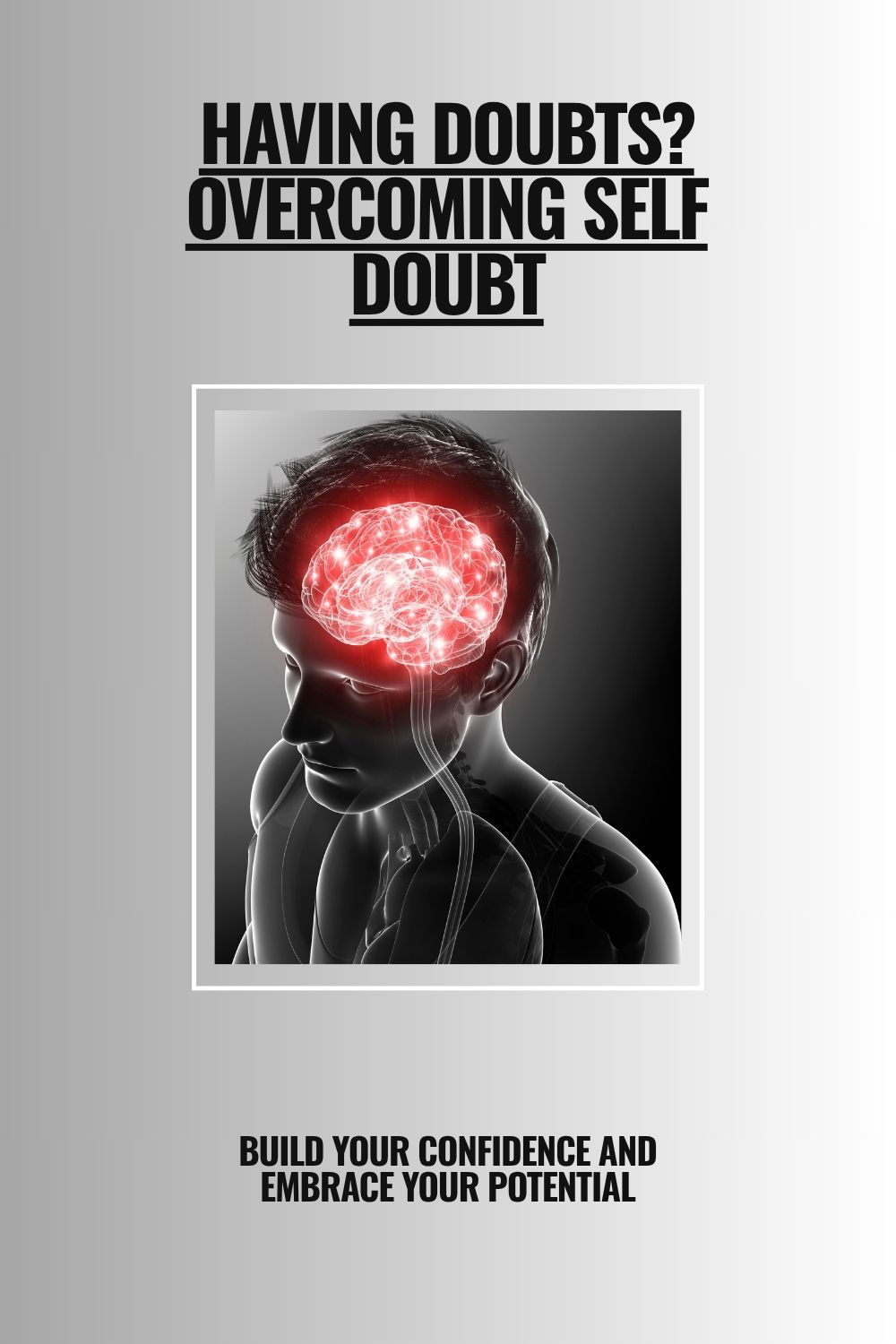Disclaimer: This post may contain affiliate links, meaning we get a small commission if you make a purchase through our link at no extra cost to you. For more information, please visit our Disclaimer Page.
You ever find yourself rethinking every decision—even after you’ve made it?
That overthinking spiral is where most people get stuck, especially when they don’t know how to use tips on overcoming self doubt in real life.
It’s one thing to hear “just be confident,” but it’s another to feel like you’re constantly falling short, even when you’re trying.
You compare yourself to everyone else.
You question whether you really have what it takes.
You try to play it safe just to avoid feeling like a failure.
But deep down, you know you were made for more than just playing small.
And you’re tired of letting fear steal opportunities from you.
You want to start making moves without needing 100% certainty first.
In this post, we’ll go through practical, real-world tips on overcoming self doubt—so you can stop sitting on your potential and start showing up fully as yourself.
Key Takeaways
- Self-doubt is normal: Everyone experiences it, but it doesn’t have to control your life or stop you from reaching your goals.
- Challenge your thoughts: Learn to question negative thoughts and find evidence that proves them wrong or offers a different perspective.
- Focus on small wins: Set tiny, achievable goals and celebrate your progress to build confidence step by step.
- Practice self-compassion: Treat yourself with the same kindness and understanding you would offer a good friend.
- Take action: Even when you feel scared, moving forward is the best way to prove your doubts wrong and build real confidence.

Table of Contents
What is Self-Doubt, Really? 🤔
At its core, self-doubt is simply a lack of confidence in your own abilities, decisions, or worth. It’s that feeling of uncertainty when you question if you’re capable, smart enough, or deserving of success. It can show up in different ways for different people.
For some, it might be a quiet whisper of “I’m not ready.” For others, it might be a loud shout of “You’re going to fail!”
It’s important to understand that self-doubt isn’t a sign of weakness. In fact, it often comes from a place of wanting to do well, of caring deeply about outcomes.
Our brains are wired to protect us, and sometimes, this protection mechanism can overreact, making us second-guess ourselves to avoid potential failure or embarrassment.
It’s a natural part of the human experience, but it can become a problem when it stops us from taking healthy risks or pursuing our dreams.
Think of it like this: Imagine you’re standing at the edge of a diving board.
You want to jump in and enjoy the cool water, but a part of you worries about belly-flopping, or if the water is too cold, or if you’ll look silly.
That’s self-doubt. It’s not about your ability to swim, but about your belief in your ability to make the jump successfully and gracefully.
Why Do We Doubt Ourselves? 🤷♀️
Understanding where self-doubt comes from can be a huge step in overcoming self-doubt. It’s rarely just one thing; often, it’s a mix of different experiences and ways of thinking.
1. Past Experiences and Failures 💔
We’ve all messed up. We’ve all failed at something, big or small. When we don’t succeed, our brains can store that memory and try to protect us from feeling that pain again. If you tried something and it didn’t work out, your mind might say, “See? You can’t do it, so don’t even try again.” This can create a pattern where past failures become proof that you’re not capable, even if the situations are completely different.
2. Comparing Ourselves to Others 👯♀️
In today’s world, it’s super easy to compare ourselves to others, especially with social media. We see people’s highlight reels – their successes, their perfect lives, their amazing achievements – and we often forget that everyone has struggles. When we compare our messy behind-the-scenes to someone else’s polished front stage, it’s easy to feel like we’re falling short. This comparison can fuel self-doubt, making us believe we’re not as smart, talented, or successful as others.
“Comparison is the thief of joy.” – Theodore Roosevelt
3. Fear of Failure (or Success!) 😱
This one might seem obvious, but fear of failure is a huge driver of self-doubt. We might be afraid of making mistakes, looking foolish, or not meeting expectations. This fear can paralyze us, making us doubt our ability to even start. But sometimes, it’s also a fear of success. What if you succeed? What new responsibilities will that bring? What if you can’t maintain that success? These fears can make us doubt our ability to handle the outcome, whether good or bad.
4. Perfectionism 🎯
If you’re a perfectionist, you might have extremely high standards for yourself. While wanting to do well is great, perfectionism can become a trap. If something isn’t absolutely perfect, you might see it as a failure. This mindset leaves very little room for error and can lead to constant self-criticism, making you doubt your abilities because nothing ever feels “good enough.”
5. Negative Self-Talk and Your Inner Critic 🗣️
This is probably the biggest culprit. We all have an inner voice, and for many of us, it can be pretty harsh. This “inner critic” loves to point out our flaws, remind us of past mistakes, and predict doom and gloom. If you constantly hear negative messages from yourself, it’s no wonder you start to doubt your abilities. This constant stream of negativity can chip away at your confidence over time.
The Sneaky Ways Self-Doubt Shows Up 🕵️♀️
Self-doubt isn’t always obvious. It doesn’t always come with a big sign saying “I’m doubting myself!” Sometimes, it shows up in sneaky ways that you might not even realize are connected to your lack of confidence.
Here are some common signs:
- Procrastination: You know you need to do something, but you just can’t seem to start. This often happens because you doubt your ability to do it well, so you put it off to avoid potential failure.
- Indecision: You struggle to make even small decisions, constantly second-guessing yourself. This comes from doubting your judgment or fearing you’ll make the “wrong” choice.
- Overthinking: You spend hours analyzing every tiny detail, playing out worst-case scenarios in your mind. This is your brain trying to control uncertainty because it doubts your ability to handle whatever comes your way.
- Avoiding New Challenges: You stick to what’s comfortable and familiar, even if you’re bored or unhappy. You avoid new opportunities because you doubt your ability to succeed or adapt.
- Seeking Constant Reassurance: You frequently ask others for their opinion or approval, even on things you know you can do. This stems from doubting your own judgment and needing external validation.
- Self-Sabotage: You might unconsciously do things that hinder your own success, like missing deadlines, showing up late, or not preparing adequately. This can be a way to confirm your own doubts (“See? I knew I couldn’t do it!”).
- Not Speaking Up: You have great ideas but keep them to yourself, fearing you’ll sound silly or be judged. This is a classic sign of doubting the value of your own voice.
Recognizing these signs is the first step toward overcoming self-doubt. Once you see how it’s affecting you, you can start to challenge it.
The Power of Understanding Your Inner Critic 🗣️
Your inner critic is that voice that tells you you’re not good enough, smart enough, or capable enough. It’s often harsh, judgmental, and can feel like it’s trying to protect you by keeping you “safe” from failure or embarrassment. But often, it just keeps you stuck.
Learning to understand and manage your inner critic is vital for overcoming self-doubt.
How to Deal with Your Inner Critic:
- Identify the Voice: When you hear a negative thought, pause and ask yourself, “Is this my true thought, or is this my inner critic speaking?” Often, the inner critic uses words like “always,” “never,” “should,” “must,” and is very critical.
- Name Your Critic (Optional but Fun!): Giving your inner critic a silly name (like “Doubtful David” or “Nervous Nellie”) can help you separate yourself from its voice. It makes it less powerful and more like a character you can observe.
- Question the Evidence: Your inner critic states opinions as facts. Challenge them! Ask: “Is this 100% true?” “What evidence do I have that this isn’t true?” “Is there another way to look at this?”
- Talk Back (Kindly!): You don’t have to accept what your inner critic says. You can gently but firmly respond. If it says, “You’re going to mess this up,” you can say, “I might make mistakes, but I can also learn and grow. I’m going to try my best.”
- Reframe the Thought: Instead of letting the negative thought take over, try to reframe it into something more helpful or realistic.
| Original Negative Thought | Challenged/Reframed Thought |
|---|---|
| “I’m going to fail this.” | “I’ll do my best, and if it doesn’t work out perfectly, I’ll learn from it.” |
| “I’m not good enough.” | “I’m learning and growing. I have unique strengths.” |
| “Everyone else is better.” | “I’m on my own journey. I’ll focus on my progress, not others’.” |
| “This is too hard.” | “This is challenging, but I can break it down into smaller steps.” |
This table shows how you can change your perspective. It’s a powerful tool for overcoming self-doubt.
Practical Strategies for Overcoming Self-Doubt 💪
Now for the good stuff! Here are actionable tips and strategies you can start using today to build your confidence and push past self-doubt.
1. Acknowledge and Accept (Don’t Fight It!) 🧘♀️
The first step isn’t to banish self-doubt, but to acknowledge its presence.
When that feeling creeps in, instead of trying to push it away or get angry at yourself for feeling it, simply notice it. “Ah, there’s that feeling of doubt again.”
Trying to fight or suppress your emotions often makes them stronger. By accepting that it’s there, you take away some of its power.
This doesn’t mean you agree with it, just that you’re aware of it. It’s like observing a cloud in the sky – you see it, but you don’t have to get caught up in it.
2. Challenge Your Thoughts (The Detective Method!) 🧐
This is one of the most powerful tools for overcoming self-doubt. As we discussed with the inner critic, your thoughts aren’t always facts. Become a detective and investigate your negative thoughts:
- Is it true? Can you prove this thought 100%?
- What’s the evidence? What facts support this thought? What facts don’t support it?
- What’s an alternative explanation? Is there another way to look at this situation?
- What would I tell a friend? If a friend had this exact thought, what advice would you give them? You’d likely be much kinder and more encouraging.
- Is this thought helpful? Does believing this thought help me, or does it hold me back?
3. Focus on Your Strengths (Your Superpowers! ✨)
When self-doubt creeps in, we tend to focus on our weaknesses or what we can’t do. Flip the script! Take time to remember your strengths, talents, and past successes.
- Make a “Wins List”: Keep a running list of everything you’ve achieved, big or small. This could be anything from getting a good grade, finishing a tough project, learning a new skill, or even just getting through a challenging day. When doubt hits, read this list!
- Ask for Feedback: Ask trusted friends, family, or colleagues what they see as your strengths. Sometimes, others see our good qualities more clearly than we do.
- Celebrate Yourself: Don’t wait for others to celebrate your achievements. Acknowledge your own efforts and progress. Want some inspiration? Check out these proud of yourself quotes to uplift your spirit!
4. Set Small, Achievable Goals (Baby Steps to Big Confidence! 👣)
Big goals can feel overwhelming, especially when you’re doubting yourself. Break down your larger goals into tiny, manageable steps. Each time you complete a small step, you build momentum and gather proof that you are capable.
For example, if your goal is to write a book, don’t just think “write a book.” Break it down:
- “Write for 15 minutes today.”
- “Outline chapter one.”
- “Research topic X for 30 minutes.”
Each completed step is a win, and wins build confidence.
This is a key part of overcoming self-doubt.
5. Learn from Mistakes, Don’t Dwell (Growth Mindset! 🌱)
Mistakes are not failures; they are learning opportunities. Everyone makes them. Instead of letting mistakes confirm your doubts, ask yourself:
- What did I learn from this?
- What can I do differently next time?
- How can this experience make me stronger?
Embrace a growth mindset, which means believing that your abilities can be developed through dedication and hard work.
People with a growth mindset see challenges as opportunities to learn, not as roadblocks that prove their inadequacy.
6. Practice Self-Compassion (Be Your Own Best Friend! ❤️)
This is crucial. Imagine your best friend comes to you feeling down and doubting themselves. Would you tell them they’re useless and should give up? Of course not! You’d offer kindness, understanding, and encouragement.
Start treating yourself with that same level of compassion. When you hear your inner critic being harsh, consciously offer yourself a kinder, more supportive message.
- “It’s okay to feel this way.”
- “I’m doing my best.”
- “I’m learning and growing.”
Self-compassion isn’t about letting yourself off the hook; it’s about giving yourself the emotional support needed to keep trying and improve.
7. Surround Yourself with Positivity (Your Confidence Crew! 🤝)
The people you spend time with have a huge impact on your mindset.
- Seek out supportive people: Spend more time with friends, family, or mentors who believe in you, lift you up, and encourage your growth.
- Limit negative influences: If certain people consistently put you down or make you feel bad about yourself, try to limit your interactions with them.
- Positive input: Read inspiring books, listen to uplifting podcasts, and consume content that makes you feel empowered. If you’re looking for daily motivation to get things done, these productive day quotes can give you a boost!
8. Take Action, Even When Scared (The “Do It Anyway” Rule! 🚀)
Self-doubt thrives on inaction. The more you put things off because you’re scared, the stronger your doubt becomes. The best way to prove your doubts wrong is to take action, even if it’s a tiny step.
- The 5-Second Rule: If you have an impulse to act on a goal, you must physically move within 5 seconds or your brain will kill the idea. Just start!
- Embrace Imperfection: Your first step doesn’t have to be perfect. It just has to be a step. “Done is better than perfect.”
Each time you act despite your fear, you collect evidence that you can do it, which slowly but surely chips away at your self-doubt.
9. Visualize Success (See It to Believe It! 🌟)
Our brains are powerful. What you focus on, you tend to create more of. Spend time visualizing yourself succeeding, feeling confident, and achieving your goals. Close your eyes and really feel what it’s like to overcome your doubts.
- Imagine yourself giving that presentation confidently.
- Picture yourself successfully completing that project.
- See yourself feeling proud and capable.
10. Mindfulness and Presence (Anchor Yourself! ⚓)
Self-doubt often involves worrying about the past or fearing the future. Mindfulness brings you back to the present moment.
- Deep Breathing: When self-doubt hits, take a few slow, deep breaths. Inhale slowly through your nose, hold for a few seconds, then exhale slowly through your mouth. This calms your nervous system.
- Sensory Check-in: Notice what you see, hear, smell, taste, and feel right now. This grounds you in reality and pulls you away from the swirling thoughts of doubt.
Being present helps you observe your thoughts without getting swept away by them, making it easier to start the process of overcoming self-doubt.
11. Celebrate Small Wins (The Power of Progress! 🎉)
We often wait for big achievements to celebrate. But celebrating small victories is incredibly powerful for building confidence. Did you finally start that task you were procrastinating on? Celebrate it! Did you speak up in a meeting when you usually wouldn’t? High five yourself!
Acknowledging these small steps reinforces positive behavior and tells your brain, “Hey, I did something good!” This positive feedback loop is essential for overcoming self-doubt and building lasting confidence.
12. Journaling for Clarity (Your Personal Coach! ✍️)
Writing down your thoughts and feelings can be incredibly therapeutic and insightful. When self-doubt is overwhelming, grab a notebook and pen.
- Dump Your Thoughts: Just write whatever comes to mind, no filter. Get all those doubts and fears out of your head and onto paper.
- Challenge on Paper: Use the “detective method” from earlier. Write down a doubtful thought, then list evidence for and against it.
- Future Self Letter: Write a letter to your future self, reminding yourself of your strengths and how you’ve overcome challenges before.
Journaling can help you see patterns in your doubt and develop strategies to address them.
13. Seeking Support (You Don’t Have to Do It Alone! 👯♂️)
It’s okay to ask for help!
- Talk to a trusted friend or family member: Sometimes just voicing your doubts to someone who listens can make them feel less powerful.
- Find a mentor: Someone who has achieved what you’re striving for can offer guidance, encouragement, and practical advice.
- Consider a therapist or coach: If self-doubt is significantly impacting your life, a professional can provide tools and strategies tailored to your specific needs. They can help you uncover deeper roots of your doubt and develop healthy coping mechanisms.
Remember, seeking support is a sign of strength, not weakness.
14. Embrace Imperfection (It’s Okay to Be Human! 💖)
This ties back to perfectionism. Understand that nobody is perfect, and making mistakes is part of being human. Release the pressure to be flawless. When you allow yourself to be imperfect, you free yourself to try, to learn, and to grow without the crushing fear of not measuring up.
“Done is better than perfect.”
15. Develop a Growth Mindset (Challenges are Opportunities! 🚀)
We touched on this earlier, but it’s worth emphasizing. A fixed mindset believes your abilities are set in stone. A growth mindset believes your abilities can be developed through effort and learning.
- Fixed Mindset: “I’m not good at public speaking, so I’ll avoid it.” (Self-doubt wins)
- Growth Mindset: “Public speaking is challenging for me, but I can improve with practice and feedback.” (Opportunity for growth)
Adopting a growth mindset fundamentally changes how you view challenges and failures, turning them into fuel for overcoming self-doubt rather than reasons to give up.
Building Lasting Confidence: Beyond Overcoming Self-Doubt ✨
Overcoming self-doubt isn’t a one-time fix; it’s an ongoing journey. As you apply these strategies, you’ll start to build a stronger foundation of self-confidence. Here are some extra tips for building lasting confidence:
- Consistent Practice: Like any skill, building confidence requires practice. Regularly challenge your negative thoughts, take small actions, and celebrate your wins.
- Self-Care: Make sure you’re taking care of your physical and mental well-being. Get enough sleep, eat well, exercise, and make time for activities you enjoy. When you feel good physically, it’s easier to feel good mentally.
- Learn New Things: Continuously learning and developing new skills can boost your sense of competence and remind you of your capacity for growth.
- Help Others: Sometimes, focusing on helping others can take the spotlight off your own doubts and boost your sense of purpose and capability.
- Reflect and Review: Regularly reflect on your progress. What doubts have you overcome? What new skills have you gained? What challenges have you navigated successfully? This reinforces your journey.
On a Final Note
Overcoming self-doubt is one of the most empowering journeys you can embark on. It’s about reclaiming your power, trusting yourself, and stepping into the amazing person you are meant to be. Remember, every small step you take, every doubtful thought you challenge, and every act of self-compassion you offer, builds the strong foundation of confidence you deserve.
You are capable. You are worthy. And you have everything it takes to achieve your dreams. Don’t let that sneaky inner critic hold you back any longer. Start applying these tips today, and watch as you transform your life, one confident step at a time! 💪
Meta Title: Overcoming Self Doubt: Your Ultimate Guide to Confidence & Growth
Meta Description: Feeling stuck? Learn powerful strategies for overcoming self doubt, challenging your inner critic, and building lasting confidence to achieve your dreams.






